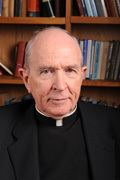Robert Sokolowski
Website
More books by Robert Sokolowski…
“There is a marvelous ambiguity to the ego: on the one hand it is an ordinary part of the world, one of many things that inhabit it. It occupies space, endures through time, has physical and psychic features, and interacts causally with other things in the world: if it falls, it falls like any other body; if it is pushed, it topples over like any other thing; if treated with chemicals, it reacts like any living organism; if light rays hit its visual organs, it reacts electronically, chemically, and psychologically. 'I' am a material, organic, and psychological thing. If we were to take the self simply as one of the things in the world, we would be treating it as what can be called the empirical ego.
On the other hand, this very same self can also be played off against the world: it is the center of disclosure to whom the world and everything in it manifest themselves. It is the agent of truth, the one responsible for judgments and verifications, the perceptual and cognitive 'owner' of the world. When considered in this manner, it is no longer simply a part of the world; it is what is called the transcendental ego.
The empirical and transcendental egos are not two entities; they are one and the same being, but considered in two ways.”
― Introduction to Phenomenology
On the other hand, this very same self can also be played off against the world: it is the center of disclosure to whom the world and everything in it manifest themselves. It is the agent of truth, the one responsible for judgments and verifications, the perceptual and cognitive 'owner' of the world. When considered in this manner, it is no longer simply a part of the world; it is what is called the transcendental ego.
The empirical and transcendental egos are not two entities; they are one and the same being, but considered in two ways.”
― Introduction to Phenomenology
“Philosophy, a love of wisdom, is both a desire for a good and an appreciation of the admirable. The good is an object of desire and love, the admirable is an object of contemplation. If we focus too exclusively on what is useful or even on what is good, we lose the capacity for admiration: “We become blind to the beauty that completes the good.” The admirable manifests itself in all the works of intelligence: in the elegance of well-formed mathematical systems, in deeply moving political speeches, in a life well lived, and in a well-ordered city. What is admirable in all of these things is the way they have to be. Their forms express this necessity, not in the sense of something relentless and overpowering, but in the sense of a fullness that displays their perfection. Philosophy is to remind us of the necessity in things: not just the necessities to which we have to resign ourselves, but those we can find splendid.”
―
―
Is this you? Let us know. If not, help out and invite Robert to Goodreads.




































